Author: Jim McLennan
DOA: Dead or Alive
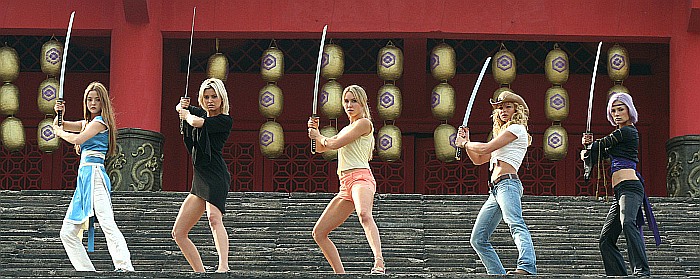 ★★★½
★★★½
“Fists of Fury”
I think it’s safe to say that I came into this with low expectations. That’s despite the presence behind the camera of Corey Yuen, who has made some great films in the past; he’s best known in the West for The Transporter, but Savior of the Soul is a personal favorite, and Yuen is no strange to the action-heroine genre, having also directed Yes, Madam and She Shoots Straight. Still, this was utterly buried on its theatrical release – it lasted a whole week at the cinema – and then consigned to ‘Exclusive to Blockbuster’ DVD oblivion. Almost two years after its originally-scheduled US release of August 2006, and 13 months after finally escaping, the movie finally made it onto the screens at GWG Towers.
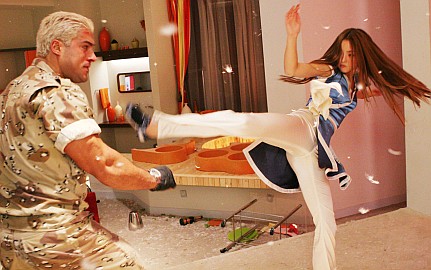 And…it’s not as bad as we feared it might be. Admittedly, I am not the best person to judge its merits in comparison to the video-game from which it was adapted. While I’ve mashed buttons on it and got my ass kicked by our son occasionally (and, somewhat oddly, Dead or Alive Xtreme Beach Volleyball, despite being a jiggle-fest of epic proportions, was a great favourite of our daughter), I don’t care one whit for how accurate the movie is to the game. The fact that Character X does not have the right colour hair, or Character Y’s kung-fu is from a different school, does not bother me in the slightest.
And…it’s not as bad as we feared it might be. Admittedly, I am not the best person to judge its merits in comparison to the video-game from which it was adapted. While I’ve mashed buttons on it and got my ass kicked by our son occasionally (and, somewhat oddly, Dead or Alive Xtreme Beach Volleyball, despite being a jiggle-fest of epic proportions, was a great favourite of our daughter), I don’t care one whit for how accurate the movie is to the game. The fact that Character X does not have the right colour hair, or Character Y’s kung-fu is from a different school, does not bother me in the slightest.
No-one is ever going to mistake any of the supermodel participants as great, unsung martial-arts talents, but between the editing, wirework, doubling and occasionally impressive moments from the actresses themselves, Yuen does a credible job of putting things together. There are certainly no shortage of action scenes, and while the editing is, of necessity, from the rapid-fire school, it does manage to retain coherence – thereby putting it above many action films, which really ought to know better. Particularly memorable is the introduction of jewel-thief Helena (Valance), who beats up a few of Interpol’s finest, unencumbered by clothing. It’s sufficiently tongue-in-cheek to come across as fun, rather than sleazy, and captures the spirit of the original nicely.
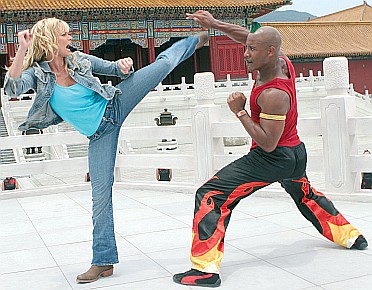 It remains, however, a movie based on a video-game, and almost inevitably this means the storyline is absolute pants. Yet another martial-arts tournament, sponsored by a rich ne’er-do-well; has nobody ever seen Enter the Dragon? [Actually, there are a couple of nods to suggest the writers have indeed done so] In this case, the particularly ludicrous Donovan (Roberts) intends to capture the skills of the participants using nanobots, and turn them into a pair of nifty sunglasses which give him all their fighting abilities. As you do. However, Kasumi (Aoki) is seeking her brother, who vanished at the same tournament last year – but because she left her clan, an assassin (Natassia Malthe) is on her trail. And so on, and so on.
It remains, however, a movie based on a video-game, and almost inevitably this means the storyline is absolute pants. Yet another martial-arts tournament, sponsored by a rich ne’er-do-well; has nobody ever seen Enter the Dragon? [Actually, there are a couple of nods to suggest the writers have indeed done so] In this case, the particularly ludicrous Donovan (Roberts) intends to capture the skills of the participants using nanobots, and turn them into a pair of nifty sunglasses which give him all their fighting abilities. As you do. However, Kasumi (Aoki) is seeking her brother, who vanished at the same tournament last year – but because she left her clan, an assassin (Natassia Malthe) is on her trail. And so on, and so on.
The weakest link in the film is likely Roberts. Not only does he sport an embarrassing pony-tail, he may also be the least convincing martial-arts star since Julian Sands in The Tuxedo, and even Yuen is hard-pushed to make him look even slightly-convincing. When Jamie Pressly has got better moves than you, it may be time to rethink your choice of roles. One yearns for someone with genuine skill to show up as an adversary for our heroines: about the closest we get to it, outside the stunt doubles, are Robin Shou, star of Mortal Kombat, who bookends the film as a pirate. Another issue is it is often difficult to tell Tina, Christie and Helena apart, especially when they are playing beach-volleyball in bikinis. That is my excuse, anyway, for why I was playing particularly close attention during those scenes. :-)
Characterization is about as deep as you’d imagine: not very. Helena is the only one who comes over as having more personality than could be scrawled on the back of a console cartridge. This really isn’t much of a problem, since no-one involved with the project is under any illusions about why the viewer is watching this, and it isn’t for subtle character studies – any more than that’s why we play the game. That’s really the key to getting the most out of the sugary confection, thinly disguised as a cinematic experience, to be found here. If the film is eminently forgettable, that will just make it all the more entertaining the next time you watch it.
Dir: Corey Yuen
Star: Jamie Pressly, Devon Aoki, Eric Roberts, Holly Valance
Wanted
★★★★
“Girls just wanna have guns.”

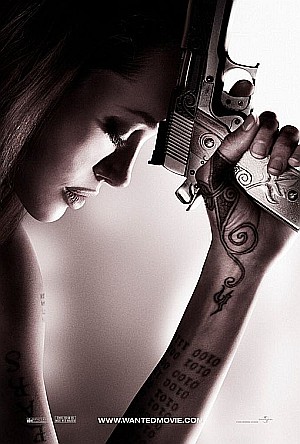 This is probably a borderline Girls With Guns flick, but Angelina Jolie is the nearest thing we have to a legitimated action-heroine superstar: Lara Croft, Mr. and Mrs. Smith and now this, where her character, the uber-assassin Fox, is certainly the most interesting in the film. Office drone Wesley (McAvoy) discovers his true heritage is in The Fraternity, a group of killers who surgically remove bad elements from society, as their names come up encoded in a cloth woven by a mystical loom. However, one of their number has gone rogue, and Cross (Kretschmann) is now taking out his former colleagues, one by one. Recruiting, training and using Wesley, is the only hope they have to stop the renegade.
This is probably a borderline Girls With Guns flick, but Angelina Jolie is the nearest thing we have to a legitimated action-heroine superstar: Lara Croft, Mr. and Mrs. Smith and now this, where her character, the uber-assassin Fox, is certainly the most interesting in the film. Office drone Wesley (McAvoy) discovers his true heritage is in The Fraternity, a group of killers who surgically remove bad elements from society, as their names come up encoded in a cloth woven by a mystical loom. However, one of their number has gone rogue, and Cross (Kretschmann) is now taking out his former colleagues, one by one. Recruiting, training and using Wesley, is the only hope they have to stop the renegade.
Based on a comic-book. That phrase covers a whole spectrum of results, good and bad. Here, this means hyperkinetic action scenes with only a tenuous connection to reality. If you’ve seen the director’s previous work – such as Night Watch and its sequel Day Watch – you’ll know what to expect, and he gets to crank it up here, with a significantly-bigger budget, and a better cast. There are some brilliant set-pieces, not least the sequence where Fox rescues Wesley, and also a fabulous sequence on a high-speed train. It plays like a high-octane remix of Office Space and The Matrix: not, perhaps, up to the brilliant levels of either, yet an interesting hybrid that is still a great deal of fun, in a highly-caffeinated way.
Less well known, this is not Tikmanbetov’s first piece of Girls With Guns cinema, as before coming to Hollywood’s attention with Night Watch, he also did The Arena, a remake of a Roger Corman movie. The original had Pam Grier – the remake, didn’t, and let’s leave it at that. Fox is rather different from the incarnation in the comic [closer there to Halle Berry than anything], yet still has more backstory than Wesley, on her tattooed arms alone; while a sequel seems likely, it looks unlikely to involve her, and that’s a shame. Still, when you see Jolie climbing out on the bonnet of her high-performance sports-car, and blazing away like a heavily-armed hood ornament, you’ll understand exactly why it qualifies here.
Dir: Timur Bekmambetov
Star: James McAvoy, Angelina Jolie, Thomas Kretschmann, Morgan Freeman
Gun control
On the importance of keeping your elbow straight when firing a gun…
La Femme Musketeer
★★★
“The Four Musketeers: The Next Generation.”
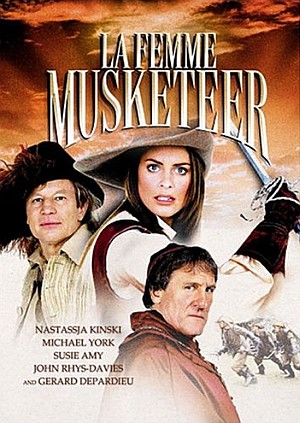 While not the first film to give D’Artagnan a daughter – the fairly self-explanatory D’Artagnan’s Daughter got there a decade before, with Sophie Marceau in the role – this is still entertaining enough, though at 171 minutes, probably too long. Valentine (Amy) heads to Paris to join the King’s guards, only to find herself framed for murder after coming into possession of a letter that could bring down the monarch. Fortunately, the other Musketeers also had children who followed in their father’s footsteps, so she has help as she tries to thwart the evil plans of Cardinal Mazarin (Depardieu) and his henchman Villeroi (Pirae).
While not the first film to give D’Artagnan a daughter – the fairly self-explanatory D’Artagnan’s Daughter got there a decade before, with Sophie Marceau in the role – this is still entertaining enough, though at 171 minutes, probably too long. Valentine (Amy) heads to Paris to join the King’s guards, only to find herself framed for murder after coming into possession of a letter that could bring down the monarch. Fortunately, the other Musketeers also had children who followed in their father’s footsteps, so she has help as she tries to thwart the evil plans of Cardinal Mazarin (Depardieu) and his henchman Villeroi (Pirae).
If its origins as a two-part TVM are largely apparent, there’s enough fun to be mined from the experience here to keep things going, not least Michael York reprising the role of D’Artagnan, which he played in the 70’s classic movies. Their offspring are similarly nicely-drawn caricatures, and Amy has a feisty quality about her that’s fitting, though quite how she is mistaken for a man escapes me. The film does try to do too much, plotwise; believing the letter isn’t enough to sustain it, the script also throws in a Spanish princess, travelling to Paris to meet with King Louis, and perhaps stop the war between the two countries. This requires much searching of the French countryside [actually, Croatia] and drags things out to no great purpose. On the other hand, the lack of any serious romance to bog things down any further, came as a pleasant surprise.
Amy holds her own in the swordfights, even if Boyum is overly fond of playing with the film speed, and often needs to move the camera back a bit further. We were looking forward to a nice catfight between her and Nastassja Kinski, who plays another one of Mazarin’s minions, with a nice line in poisoned hatpins. Don’t get your hopes up; instead, the climax pits Valentine against Villeroi. The accents on display are also all over the place: Depardieu is the only one who sounds French, obviously – except, his character is actually Italian! If you can cope with that, and the inherently nonsensical nature of the central concept, you should be okay with this.
Dir: Steve Boyum
Star: Susie Amy, Marcus Jean Pirae, Gérard Depardieu, Casper Zafer
She-Wolves of the Wasteland
★½
“After the apocalypse, civilization will collapse. Fortunately, off-road vehicles and hair-care products will remain in abundant supply.”
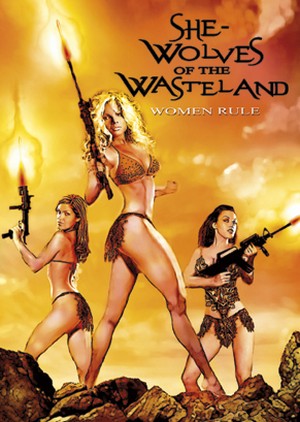 I remember seeing this under its original title back in the 1990’s, and being unimpressed by it then. Fooled into acquiring it on DVD under its new name, time has not been kind to this distaff version of Mad Max. Phoenix (Kinmont) finds herself taking care of Keela (Sanders), who is pregnant with a male child – a rarity, in a world which, thanks to biological war, is populated almost entirely by women. Overseeing things is the Reverend Mother (Howard) and her sidekick Cobalt (Khambatta), who are intent on keeping control. And, boy, can they hold a grudge, since Keela goes from utterly flat, to giving birth, to being the mother of a kid at least four years old, in the space of about two minutes cinematically. Not quite sure what the villains are doing during this time: presumably ruling over an empire populated entirely by extras from a Duran Duran video,
I remember seeing this under its original title back in the 1990’s, and being unimpressed by it then. Fooled into acquiring it on DVD under its new name, time has not been kind to this distaff version of Mad Max. Phoenix (Kinmont) finds herself taking care of Keela (Sanders), who is pregnant with a male child – a rarity, in a world which, thanks to biological war, is populated almost entirely by women. Overseeing things is the Reverend Mother (Howard) and her sidekick Cobalt (Khambatta), who are intent on keeping control. And, boy, can they hold a grudge, since Keela goes from utterly flat, to giving birth, to being the mother of a kid at least four years old, in the space of about two minutes cinematically. Not quite sure what the villains are doing during this time: presumably ruling over an empire populated entirely by extras from a Duran Duran video,
This is feeble, in just about every way imaginable. The action is laughably inept, the script makes no sense at all, and the production values are entirely unconvincing. The actresses, bless their hearts, try to do the best they can, but Meryl Streep would be hard pushed to deliver the dialogue they’re given here. The makers throw in an entirely gratuitous waterfall sequence to provide the nudity the leads presumably wouldn’t do, and while there are occasional aspects that show imagination was not entirely absent [the tribe inspired by a cargo cult of television], these are few and far between. Despite one of the most inspired covers in recent history – almost worth the price of this budget DVD by itself – I struggled to remain conscious after the first 20 minutes. Even for devoted fans of badfilm such as ourselves, this is tough to handle.
Dir: Robert Hayes
Star: Kathleen Kinmont, Persis Khambatta, Peggy Sanders, Sheila Howard
a.k.a. Phoenix the Warrior
Princess of Thieves
★★
“The Middle Ages – sanitized, for your protection.”
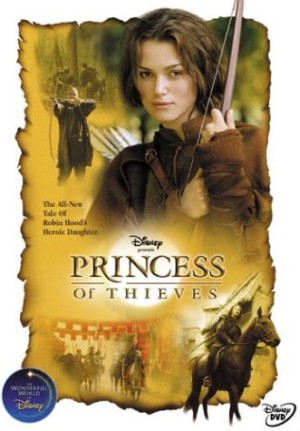 Back before Pirates of the Caribbean made Knightley a household name, and even before Bend It Like Beckham made her an obscure name, as a fifteen-year old she shot this Disney TVM, which rewrites history wholesale from the very start. It begins in 1184, claiming this is the reign of Richard the Lionheart – this must come as a surprise to Henry II, since he didn’t die until 1189. It also introduces Philip, Richard’s supposed illegitimate son, out to replace the evil King John; in reality, Philip may not have existed and certainly left no mark on history. However, the film needs a romantic lead, so there you go. Of course, the whole Robin Hood mythology is more a block of clay, that writers and film-makers have seen fit to mould as they wish.
Back before Pirates of the Caribbean made Knightley a household name, and even before Bend It Like Beckham made her an obscure name, as a fifteen-year old she shot this Disney TVM, which rewrites history wholesale from the very start. It begins in 1184, claiming this is the reign of Richard the Lionheart – this must come as a surprise to Henry II, since he didn’t die until 1189. It also introduces Philip, Richard’s supposed illegitimate son, out to replace the evil King John; in reality, Philip may not have existed and certainly left no mark on history. However, the film needs a romantic lead, so there you go. Of course, the whole Robin Hood mythology is more a block of clay, that writers and film-makers have seen fit to mould as they wish.
Here, when Robin is arrested trying to link up with Philip (Moyer), it’s his daughter, Gwyn (Knightley), who puts together her own band of merry men, with the aim of both rescuing her father and putting Philip in his rightful place on the throne. Archery contests and the Sheriff of Nottingham (McDowell) ensue, until Philip, under an assumed name, joins her posse, and the inevitable romantic attraction begins. This is much to the chagrin of Froderick (Synnott), Gwyn’s longtime companion from when she grew up in a monastery [her dad being off crusading with Dick]. However, since he has a crap haircut, it’s clear Frodork doesn’t have a chance with the perfectly-complexioned Gywn and her immaculate teeth.
It is largely bland, unthreatening and unsatisfying, yet not entirely unwatchable. Knightley – only 15 when she made it – clearly has star potential, and her archery experience must have come in handy for her later role in King Arthur. Early on, there is an almost Mulan-like feel, with Gwyn defying her father and dressing as a boy. However, the more the film proceeds, the more she is shuffled off to the side in favor of Philip, who is much less interesting a character, especially from this site’s point of view. McDowell is as reliably evil as ever, while Jonathan Hyde does his best Alan Rickman impression as King John, yet, inevitably, comes off as a poor imitation. If this isn’t worth paying money for, as a Saturday afternoon diversion on TV, it’s tolerable.
Dir: Peter Hewitt
Star: Keira Knightley, Stephen Moyer, Malcolm McDowell, Del Synnott
Pistol Opera
★½
“Whiskey Tango Foxtrot?”
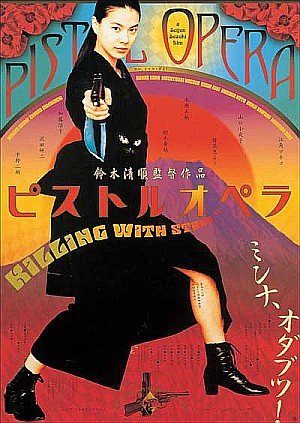 I don’t think I have ever been quite so flummoxed by a girls-with-guns film. To say it’s not quite what I expected is an understatement, but it’s also my first experience of Seijun Suzuki, who is one of the icons of Japanese cinema. The basic plot centers around Stray Cat (Esumi), the current #3-ranked assassin; there’s a guild who decide such things, but they are on the edge of anarchy and Cat gets the assignment from her manager (Yamaguchi) to target the #1, Hundred Eyes. However, there are a lot of people with their own agendas, not least Sayoko (Han), a young girl who wants Cat to teach her the ways of murder.
I don’t think I have ever been quite so flummoxed by a girls-with-guns film. To say it’s not quite what I expected is an understatement, but it’s also my first experience of Seijun Suzuki, who is one of the icons of Japanese cinema. The basic plot centers around Stray Cat (Esumi), the current #3-ranked assassin; there’s a guild who decide such things, but they are on the edge of anarchy and Cat gets the assignment from her manager (Yamaguchi) to target the #1, Hundred Eyes. However, there are a lot of people with their own agendas, not least Sayoko (Han), a young girl who wants Cat to teach her the ways of murder.
On the basis of this, I’d file Suzuki somewhere between David Lynch and Guy Maddin, for large chunks of this make no sense. Characters deliver long, rambling monologues of no real significance to the camera [one particularly vague one involves flags], in front of a surreal landscape that is as much self-consciously artificial as it is realistic. It is apparently a reworking of the director’s own Branded to Kill, except with a female protagonist. More than 30 years – plus, it would appear, a truckload of drugs and a severe case of Alzheimer’s – passed in the meantime, and it’s clear Suzuki did not spend it working on the plot.
Sure, it looks lovely, but the girls-with-guns experience is not founded upon Art with a capital A. It’s something that should head directly for the lizard-brain, to deliver a heady payload of taboo-breaking violence. I have no objection to the artistically surreal in cinema generally [Peter Greenaway is a personal favourite]. However, there still needs to be something coherent and interesting behind it, otherwise you might as well just eat a large pizza and go to sleep – the imagery will be just as good, and it’s a better use of your time. In 1968, Suzuki got fired by major studio Nikkatsu, who said that they “could not afford to cultivate a reputation for making films understood only by an exclusive audience,” and that his “incomprehensible and thus bad films would disgrace the company.” Frankly, I’m in full agreement with the studio.
Dir: Seijun Suzuki
Star: Makiko Esumi, Sayoko Yamaguchi, Mikijiro Hira, Yeong-he Han
Blitzkrieg: Escape from Stalag 69 trailer
Readers will know how Ilsa, She-Wolf of the SS is one of our guiltiest pleasures – and so, Werewolf Women Of The S.S. was about our favorite part of Grindhouse. While we wait for that to get made, Wild Eye Releasing didn’t, and have brought us Blitzkrieg: Escape from Stalag 69, which had it’s world premiere on May 24th in New York. Here’s the trailer. At the risk of stating the bleedin’ obvious, it’s Not Safe For Work. And we wouldn’t have it any other way!
The player will show in this paragraph
<
Hook ‘n’ Shoot: Revolution
★★★
“Pretty much the first of its kind – with all that implies.”
 These days, the notion of women participating in mixed martial-arts is no longer seen as particularly outlandish, with names like Tara LaRosa, Yuka Tsuji and Megumi Fujii among the top fighters [as with pro wrestling, the best fighters are out of Japan]. However, this wasn’t always the case: In April 2002, in Evansville, Indiana, one of the first all-women events in America took place. The fights took place under Shooto rules, with two five-minute rounds [though only one fight ended up going into the second]. Here are quick recaps of the seven bouts on the DVD.
These days, the notion of women participating in mixed martial-arts is no longer seen as particularly outlandish, with names like Tara LaRosa, Yuka Tsuji and Megumi Fujii among the top fighters [as with pro wrestling, the best fighters are out of Japan]. However, this wasn’t always the case: In April 2002, in Evansville, Indiana, one of the first all-women events in America took place. The fights took place under Shooto rules, with two five-minute rounds [though only one fight ended up going into the second]. Here are quick recaps of the seven bouts on the DVD.
- Ruth Meija -vs- Erica Montoya Over in 2:32 with an arm-bar, but pretty one-sided. Montoya was in complete control and also landed some hard shots on her opponent.
- Olga Bakalopoulas -vs- Shannon Hooper A better fight, with more well-matched opponents. Hooper wanted to stand and punch, but it was Bakalopoulas who came out on top; she managed to knock her opponent down (albeit more by luck than anything) and applied a keylock submission for victory in a little more than two minutes.
- Jennifer Irons -vs- Jessica Ross A triangle choke submission ended this one at 1:48 in favor of Ross, even though she was giving away a fair amount of weight. Ross is more of a grappler, but got some good blows in, and also showed decent ground skills.
- Tanya Vlahac -vs- Angela Wilson This was a barn-burner, with both women trading hard punches. Vlahac also dropped Wilson with one particular punch, but Wilson used her judo skills to bring her opponent down, and then took control, hitting Vlahac until the referee stopped the fight.
- Shelby Walker -vs- Tara LaRosa LaRosa pounded her opponent into submission, after taking her down. From there on, it was an onslaught of punishment, and I can’t say I’m surprised that LaRosa went on to make a name for herself in the field. Sadly, Walker died, apparently from an overdose of pain medication, in 2006.
- Angela Restad -vs- Mayra Conde Almost all the early offense here was by Conde, with Restad simply trying to survive on the ground. However, as round one wore on, Restad came back, with some solid knees and combinations. The second round continued in a similar way, with Conde having the advantage on the floor, but Restad landing good blows. Conde almost got an arm-bar, but Restad escaped and almost got a choke of her own. This ended in a majority draw – two called it even, one gave it to Restad. A fair result, but the best fight of the night,
- Debi Purcell -vs- Chris Van Fleet Purcell was clearly the better fighter, and had the edge from the start with a powerful punch. However, Purcell also showed good submission skills, and got under the guard of Van Fleet, taking her down for a relatively quick victory, forcing her opponent to tap at 2:42, with a Rear Naked Choke.
Obviously, the scarcity of female mixed martial artists in the US posed something of a problem to the promoters, with the matches apparently made mostly on weight alone. The Restad-Conde match is the only one whose outcome is not certain inside about 30 seconds, and that one is one of the best MMA bouts I’ve seen, male or female. The special features on the DVD include additional interviews with the fighters, who mostly come across as smarter than you might expect, and also Erin Toughill, who was present but not taking part. Two more volumes are available in the series; on the basis of this one, I’d be interested in watching them, but not buying them unseen.



















